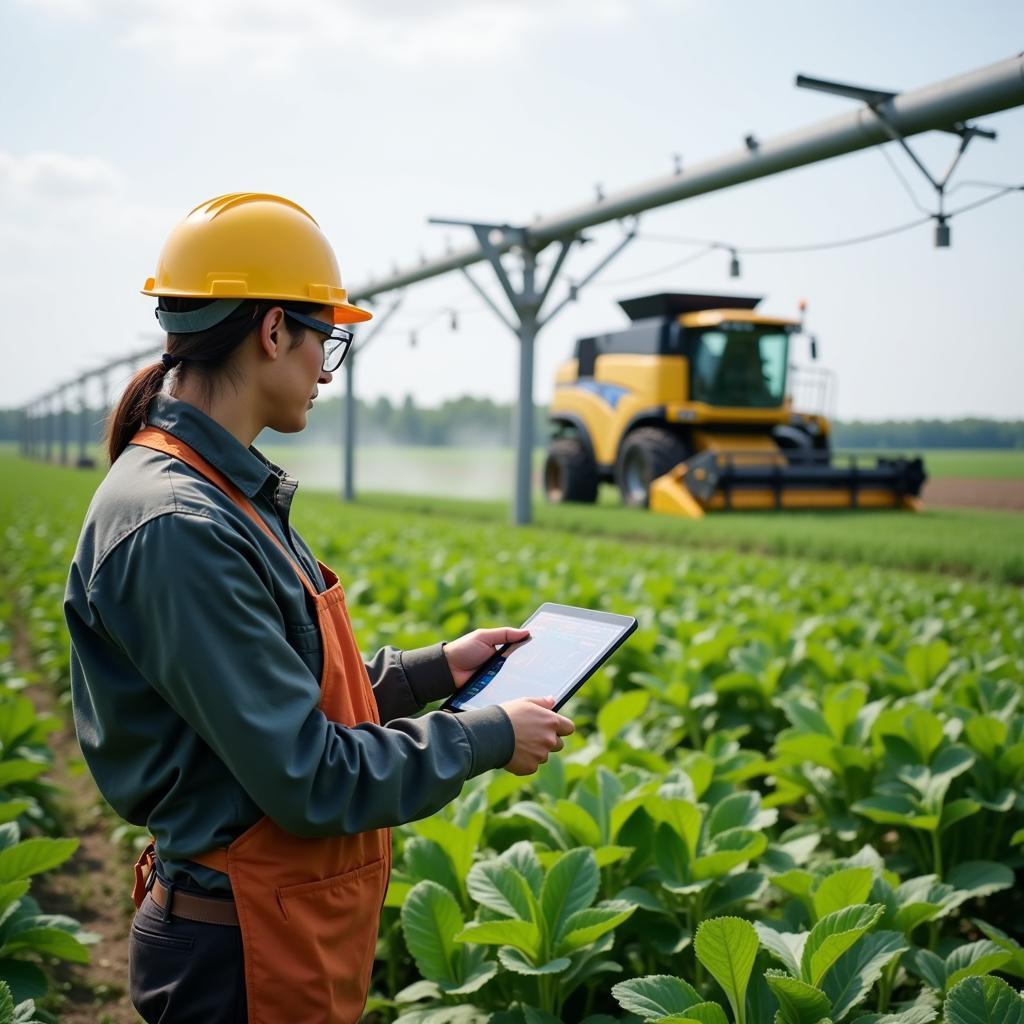The intersection of artificial intelligence and agriculture has become an increasingly common topic in IELTS Writing Task 2, appearing in various forms over the past few years. As how does automation change the future of agriculture continues to shape our world, we can expect more questions about technological advancement in farming. Here are some recent exam questions that have appeared in actual IELTS tests.
Essay Question Analysis
Some people believe that artificial intelligence and automation will completely transform agriculture, eliminating the need for human farmers. To what extent do you agree or disagree with this statement?
This question requires candidates to evaluate the impact of AI and automation on farming and express their opinion about whether these technologies will fully replace human farmers. Let’s examine some sample responses at different band levels.
Band 8.5 Sample Essay
Recent technological advancements have led many to predict that AI and automation will revolutionize farming, potentially making human farmers obsolete. While I acknowledge the significant impact these technologies will have on agriculture, I disagree with the notion that they will completely eliminate the need for human involvement.
Undoubtedly, AI and automation are transforming agricultural practices in unprecedented ways. How automation is transforming the agricultural sector can be seen through precision farming, automated harvesting systems, and AI-driven crop monitoring. These technologies enhance efficiency, reduce waste, and optimize resource utilization. For instance, AI-powered drones can analyze vast fields in minutes, detecting plant diseases and nutrient deficiencies that human eyes might miss.
However, complete automation of agriculture faces several significant limitations. Firstly, farming requires complex decision-making that combines experience, intuition, and local knowledge – qualities that AI currently cannot fully replicate. Additionally, how urban farming can support food security demonstrates that human expertise remains crucial in adapting agricultural practices to specific contexts and conditions.
Furthermore, while machines excel at repetitive tasks, they struggle with adapting to unexpected situations or handling delicate operations. Human farmers possess invaluable skills in crop selection, soil management, and sustainable farming practices that stem from generations of accumulated knowledge. How can digital technologies be used to reduce food waste? shows that the most effective solutions combine technological innovation with human oversight.
In conclusion, while AI and automation will continue to revolutionize farming practices, they will serve as powerful tools that enhance human capabilities rather than replace farmers entirely. The future of agriculture lies in the synergy between technological advancement and human expertise.

Band 6.5 Sample Essay
Many people think that AI and robots will take over farming completely from humans. I partly agree with this idea because while technology will change farming a lot, humans will still be needed.
First, AI and robots are very good at doing many farming jobs. They can plant seeds, water crops, and pick fruits faster than humans. They don’t get tired and can work all day and night. Also, they can check soil conditions and plant health using special sensors.
However, farming needs human skills too. Farmers know many things about their land that machines can’t understand. They can make better decisions about when to plant and harvest based on their experience. Also, some jobs like fixing broken machines and planning what to grow need human thinking.
Sometimes weather or plant diseases can cause problems that robots might not know how to handle. Humans can think of new solutions and adapt quickly to these problems. Also, many people prefer to buy food grown by real farmers rather than just machines.
In conclusion, while AI and automation will make farming more modern, they won’t completely replace human farmers. The best way is to use both technology and human skills together in farming.
Key Vocabulary
- Precision farming (n) /prɪˈsɪʒən ˈfɑːmɪŋ/ – farming management based on observing and responding to field variations
- Automation (n) /ˌɔːtəˈmeɪʃən/ – use of automatic equipment and machines
- Synergy (n) /ˈsɪnədʒi/ – interaction of elements that produces greater combined effect
- Obsolete (adj) /ˈɒbsəliːt/ – no longer needed because something better exists
- Unprecedented (adj) /ʌnˈpresɪdentɪd/ – never having happened before
- Intuition (n) /ˌɪntjuˈɪʃən/ – ability to understand something immediately
- Optimization (n) /ˌɒptɪmaɪˈzeɪʃən/ – making something as effective as possible
Consider practicing with these similar topics for future preparation:
- The role of robotics in modern farming
- Impact of digital technologies on food production
- Sustainable agriculture in the age of automation
Feel free to share your practice essays in the comments section for feedback and discussion.